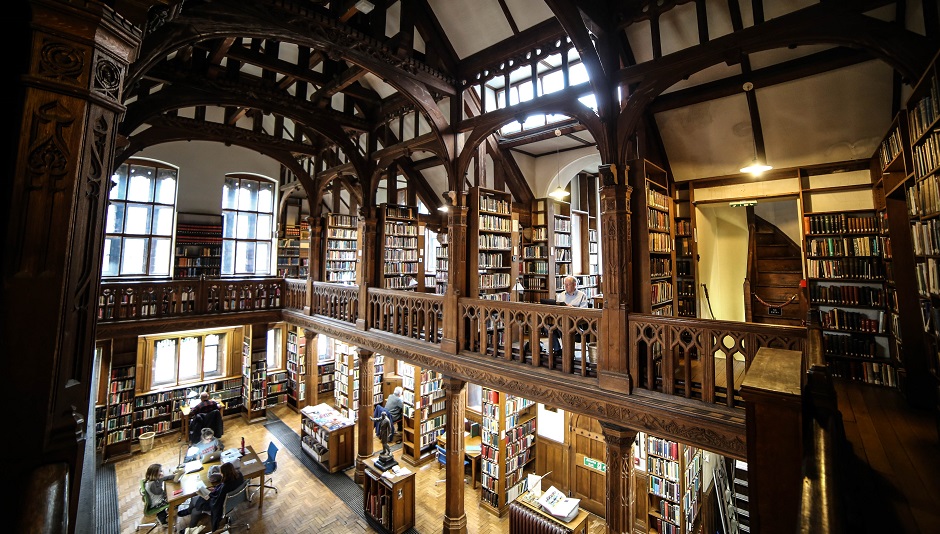We can be quite traditional here at Gladstone’s Library: the Reading Rooms are silent study areas; we don’t allow food near the books; and ‘No, we won’t let you take that rare and precious Gladstone Foundation Collection book home with you tonight, Sir – we are not a lending library!’ In other ways though, we like to think of ourselves as quite innovative. We have a year-long programme of events and courses that cover everything from traditional core subjects like rare books and Latin, to more unique ones like film and theology, dystopian futures, and the importance of failure as a writer. We’ve seen yoga, mindfulness and A Capella classes in our Chapel and our library staff are actively growing special collections such as ‘Exploring Capitalism’ which was established in response to the Global Financial Crisis of 2007.
Earlier this month we hosted another ‘unique’ conference: Alibis in the Archive 2019, a packed weekend hosted in association with the Crime Writers’ Association (CWA) and The Detection Club. This event, run yearly since 2017, celebrates British crime-writing both past and present through talk sessions and panels that centre on the British Crime Writing Archive. This archive, which incorporates the records and documentation of two august crime writing associations, the CWA and the Detection Club, has had its home in Gladstone’s Library since 2015 when CWA Archivist and local author Martin Edwards, began working with us to make the CWA archives more accessible to the public [1].
Hosting a conference at Gladstone’s Library is a unique experience. We are a Grade I listed heritage building which was built in 1902 as both the national memorial for former Prime Minister William Ewart Gladstone, and as a residential library. If our founder had any idea that we would be hosting events for hundreds of people in the future then he left no obvious trace and his plans for the building reflect a more intimate understanding of the library with many smaller rooms that can be used for small group discussion and study rather than large group events. Thankfully, over the years we have developed a number of bespoke conference spaces that are now used by many local (and not so local) businesses and organisations, including our Chapel which can house up to 40 people, and the Glynne Room which can house up to 36. With Alibis, however, it is not our dedicated conference rooms that become the stage, but the library itself!
Gladstone’s Library’s reading rooms consist of three spaces – each different in size, focus and use. The smallest room is the House of Wisdom, which houses our Islamic studies collection and only holds one large study table. The second is the History Room, which, contrary to its name, does not hold our history book collection but the Gladstone Foundation Collection books, the original holding donated to the library on its establishment by our founder. The largest reading room (and the one most frequently shared in pictures on social media) is the Theology Room, which consists of two floors full of books on theological matters and which can be cleared of study tables and miscellaneous displays to be used as a grand intellectual salon.
Previous guests that have spoken at events in the Theology Room include former Deputy Prime Minister Nick Clegg, philosopher and author A.C. Grayling, author of The Essex Serpent Sarah Perry, critic and author Loyd Grossman, author Ann Cleeves whose novels have been adapted into ITV’s Vera and BBC’s Shetland TV series, and more. Many of these talks and lectures can now be streamed on Gladstone’s Library’s Soundcloud page here.
It is brave of our library staff to use the Theology Room for events. While we know that most people will be respectful of library books, there is always a danger of accidental damage to the collection. Disruption to our users is also something we try to avoid, which is why half of the library remains open during Alibis with appropriate signage mentioning the possibility of noise disruption and the need to ask librarians to retrieve books from restricted areas. However, the Theology Room is such a beautiful space that it would be a shame for its usually silent atmosphere never to be filled with cheerful discussion and professional insight. Though we cannot know what William Ewart Gladstone would have felt about the use of his reading rooms for an event such as Alibis, it is hard to believe he would ever spurn a group of booklovers eager to talk about their favourite genre, for he believed that libraries should be a welcoming place and in one of his usual quotable phrases he made his position clear:
‘Books are a delightful society. If you go into a room filled with books, even without taking them down from their shelves, they seem to speak to you, to welcome you.’
By Sophie Hammond, Graduate Work Experience
References
[1] https://www.gladstoneslibrary.org/reading-rooms/the-collections/archives/british-crime-writing-archive [Accessed 21/06/2019]
